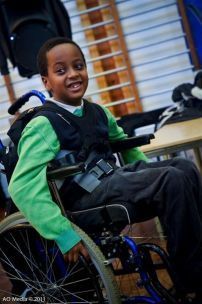Siblings Of Disabled Children More Likely To Develop Functional Problems From Household Stress

Parenting a disabled child can often be stressful and time consuming, and although it's all for the love of the child, their siblings could become lost in the mix, and feel neglected. Researchers have found that children with disabled siblings are more likely to develop functional problems.
"What goes on in these households? There is financial, psychological and emotional stress," study author Anthony Goudie, an assistant professor in the department of pediatrics at the University of Arkansas, told HealthDay. "Parents have to cut back hours at work, spend time coordinating care, bring their child to hospital appointments and don't typically have the time or energy with the well sibling to bond effectively."
Because of the unintended neglect, Goudie says that many of the kids may go on to develop mental illnesses, such as depression and anxiety disorders, Reuters Health reported. Further exacerbating the problem, a parent may be too consumed with taking care of their disabled child that they may not notice problematic signs in their other child.
Siblings Of Disabled Children More Likely To Have Functional Impairment
Goudie looked at data from the Medical Expenditure Panel Survey, which is used by the U.S. Agency for Healthcare Research and Quality to survey households throughout the country. The survey asked participating parents about their children's behavior, relationships, school performance, activities, and emotions. All children were aged 5-17.
There are currently 2.8 million children with reported disabilities in the U.S., according to the Census Bureau.
When looking for disabled kids with siblings, Goudie left the definition for a disability open without limitations. The child only had to have difficulty doing things that kids their age normally did, including difficulty breathing, swallowing, or using language.
Then he surveyed parents of 245 disabled children with siblings, and the parents of over 6,500 children who had typically developed siblings. Using the Columbia Impairment Scale, parents answered questions about the child without disability ranging from how willing they were to get along with other kids, whether they had a problem with feeling sad or nervous, and if they were inclined to participate in sports or other activities. Of the kids with disabled siblings, 24 percent were considered to have problematic functioning or cause for worry, compared to only 10 percent of children with typically developed siblings.
What Can Parents Do For The Neglected Sibling?
If this increased impairment result from a parent's neglect, Goudie suggests two options: seeking counseling for the child or finding someone to take care of the disabled child for a day to spend one-on-one time with the healthy sibling.
Debra Lobato, director of child psychology at Rhode Island Hospital/Hasbro Children's Hospital in Providence, says that the results can highlight the importance of caring for siblings of a disabled child, since they could be at a higher risk for functional problems.
"The kids are living under more stress," she told Reuters. "Not everybody breaks under the stress, but there's a significant number who find this to be a very difficult situation." She says that learning about a kid's mental distress early on could lead to greater success with intervention.
The Study's Shortcomings
But even Lobato has her doubts about the study's findings.
"It's possible that their own experience colors how they see their healthy, typical kids doing," she said. A parent with trouble functioning themselves could see their children as having more trouble too, even when they are not.
"The way the data was collected, it's like a snapshot in time, and it would be great to be able to track or show that when parents were under more stress, there were exacerbated problems with the brothers and sisters," said Adam Carle, an assistant professor of pediatrics at the University of Cincinnati, School of Medicine, said.
Source: Goudie A, Havercamp S, Jamieson B, et al. Assessing Functional Impairment in Siblings Living With Children With Disability. Pediatrics. 2013.
Published by Medicaldaily.com



























